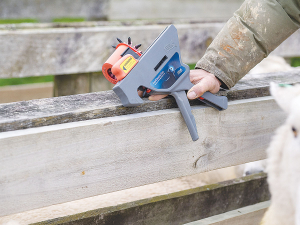Collar, monitoring tech use on-farm set to climb
The use of collars and monitoring technology use on farm is expected to keep climbing, says MSD New Zealand livestock business unit lead Pauline Calvert.
 The newly released Allflex RapIDMatic Evo tagger and RapID Evo tags were tested last docking at Te Tumu Station, east of Dannevirke.
The newly released Allflex RapIDMatic Evo tagger and RapID Evo tags were tested last docking at Te Tumu Station, east of Dannevirke.
Tagging thousands of new-born lambs at docking takes precision and tag technology that handles the volume at a good pace.
After successful trials on several farms last spring, Allflex launched its new generation RapIDMatic Evo applicator and RapID Evo tags nationwide just before Fieldays 2025.
Among the trial farms was Hawke’s Bay coastal property Te Tumu Station where the new RapIDMatic Evo applicators reliably installed RapID Evo tags in more than 10,000 lambs at docking.
Manager Jaime Pickens says Te Tumu’s total lamb crop is destined for finishing on chicory for the Lumina lamb programme through sheep genetics and logistics company Headwaters, so lambs must be tagged at docking to ensure a traceable source of data on every animal.
Jamie says the new RapIDMatic Evo applicator is a significant step forward on the earlier model applicator.
“There is no jamming with the RapIDMatic Evo applicators and that meant the docking team could get through the mobs without any stoppages and at a good pace,” he says.
He deliberately ordered extra new RapIDMatic Evo applicators to ensure he had several back-ups, just in case of breakdowns, however, that proved unnecessary and three of the new applicators remained unopened at the end of docking last spring.
He says excellent tag retention was a big advantage from using the new RapID Evo tags so they can track the grazing history for each lamb and capture the premium available from supplying the Lumina programme.
Pickens also likes the compact design of the new RapIDMatic Evo applicator and says they are easy to operate even when lambs are tucked into a docking chute.
Each applicator can take up to 20 tags in a roll which also improves the speed of application. The tags can be ‘prerolled’ so they are ready to load into the applicator as the previous roll runs out.
Allflex NZ sales lead Christopher Jennings says he is pleased with the feedback from farmers on the company’s new RapIDMatic Evo applicator and RapID Evo tags.
“The new tamper proof cap on our tags significantly improves their retention and reduces the risk of over application, so shearers and farm staff will appreciate the tip of the bayonet on the tag won’t catch on them when they are handling sheep on farm,” he says.
The new RapID Evo tags have a high-quality transponder built into the stem to maximise EID read distance and the tags are available in strips of 20 in a range of colours, printed in both alpha and numeric options.
The new RapIDMatic Evo multi-shot applicator features a larger internal barrel with an improved tag feeder and guide for easier loading of tags and less jamming.
“The cutting mechanism that separates each tag has been improved for increased reliability of tag application and we’ve added new shock absorbing handles on the applicator to reduce the jarring effect for users as well.”
Te Tumu Station
Te Tumu Station is part of Big Rural Limited, the farming enterprise owned by Big Save Furniture. The station covers 2500ha in total and has about 2000ha effective, running 1000 cows and up to 9000 ewes in a terminal sire operation.
Replacement twotooths are bought in each year so all the ewe flock is mated to terminal sires and all the lambs are moved on to other Headwaters client farms for finishing for the Lumina lamb programme, says station manager Jaime Pickens.
“All our lambs are tidied up by March each year so we can avoid the typically dry East Coast conditions and put the feedback into ewes and cows for next season’s crop of lambs.”
The cows are mated to Rissington sires and the bull progeny are returned to Rissington for its dairy sire programme.
Recent weather events in the Bay of Plenty, Gisborne/Tairawhiti, and Canterbury have been declared a medium-scale adverse event.
DairyNZ's chief executive Campbell Parker says the 2024/25 dairy season reinforces the importance of the dairy sector to New Zealand.
A New Zealand agribusiness helping to turn a long-standing animal welfare and waste issue into a high-value protein stream has won the Australian dairy sector's top innovator award.
OPINION: A bumper season all around.
Dairy Women's Network (DWN) has announced that Taranaki dairy farmer Nicola Bryant will join its Trust Board as an Associate Trustee.
Rural Women New Zealand (RWNZ) says it welcomes the release of a new report into pay equity.

OPINION: A mate of yours truly reckons rural Manawatu families are the latest to suffer under what he calls the…
OPINION: If old Winston Peters thinks building trade relations with new nations, such as India, isn't a necessary investment in…